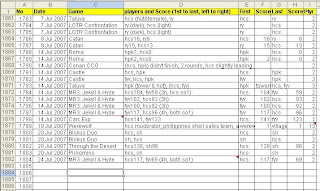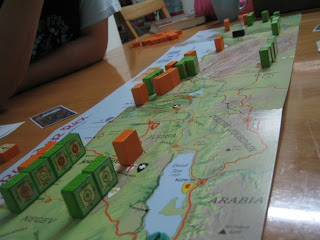Reiner Knizia is one of the most prolific and well-respected Eurogame designers. When I look at the games in my collection, there is a very wide range of designers. Among the games that I like a lot, I find that most of them are designed by different designers. Reiner Knizia is the only designer whose games I own, and like, at a disproportionate ratio, compared to games by other designers.
Knizia's design style pretty much encapsulates the Eurogame design philosophy - simple and streamlined rules, short playing time, clever mechanisms and meaningful decisions. Knizia does have his own unique style of game design. There are more intricacies that make his games different from those by other designers. So what makes me like so many of his games, compared to other designers?
The first thing that attracts me to Knizia's game is the simple rules. It is not the simplicity itself that attracts me. When I first learn about a Knizia game, I read the rules or reviews and I can quickly understand how the game plays. Some of his games are quite clever. So once I obtained a quick understanding of how the game works, I am interested to give it a try. I have home-made quite a number of Knizia games. Because of the rule simplicity of many of his games, it is sometimes quite easy to home-make them. E.g. En Garde just needs a simple board, 2 player pieces, 2 scoring markers, and cards numbered 1 to 5. Simplicity brings me in, but simplicity itself cannot make me stay. There are many other elements of Knizia's designs that make me like his games.
Many of Knizia's games are very clever. There is often a unique game mechanism, something that makes you think, "This is ingenious!". En Garde is a very simple game about fencing. Yes through the simple rules and game play, you can really see how much it feels like fencing - the bluffing, the positioning of your pawn, guessing your opponent's hand of cards, taking a risk when moving into "attack range" of your opponent. Clever! When I read the rules of Medici vs Strozzi, a 2-player-only version of Medici (which is a 3-6 player game), I was very impressed with how Knizia managed to create this 2-player version of an auction game, which really does work, and yet has so many similarities to it's predecessor. Later when I played Medici vs Strozzi, I found that it felt different from Medici, and the strategies were different. I like Medici more. But still, I am very impressed with the design of Medici vs Strozzi.
Because of the simple rules, many of Knizia's games are easy to learn, and players can also quickly learn the strategies. It is fun to discover and explore a game, to try different tactics and see which ones work under which situations. Blue Moon City is a game like this. New players can quickly catch on, and sometimes even win the game. It happened to both Ricky and Jeanne in their first games, when they played with others who have played the game before. It is rewarding and satisfying to be able to understand a game quickly and be able to learn and apply the tricks quickly. Streamlined, clean and intuitive rules definitely help in this regard. Being easy to learn and to pick up strategies does not necessary mean a game is too simple and shallow. Sometimes a game simple on the surface can still offer some unexpected depth. It still offers players some nuances to be discovered through more plays. Modern Art, a game about auctioning pieces of art and then selling them, seems straight-forward enough. A player can quickly learn to calculate what are the possible values of a painting, even in his/her first game. However, as he/she plays a bit more, he/she will start to discover the importance of guessing which artists the other players are betting on, guaging the relative positions against other players, thinking about whether it is better to earn money up front when auctioning off own paintings or to earn money at the end of a round when selling all previously bought paintings.
Some Knizia games are very subtle. There is a lot of depth that is not immediately apparent. Sometimes the game can even seem boring at first try. However, if you give it a few more tries, you will gradually find out and appreciate the beauty of the design. Tower of Babel is one such game. On your turn, you only have two options - you draw a card, or you attempt to build part of one of the wonders of the world, and other players may offer to help you. The reward for successfully building part of a wonder is either you collect a token, or you place your influence on the wonder. Players score points by 3 main ways (there are others): (a) when a wonder is completed, (b) when your kind offer to help build a wonder gets rejected, and (c) at game end depending on the tokens you have collected. Although the basic game turn is so simple (so simple that in fact it can feel repetitive), there is a lot of subtlety in where you want to focus, how to maximise your score, and how to hinder your opponents.
Most of Knizia's games have some form of luck. In most of them, despite the luck element, there are many ways for you to mitigate the luck. So you feel that your luck does not determine whether you win or lose, but it is how well you manage your luck and how well you manage your risks that determines whether you win or lose. At one end of the spectrum there are games like
Pickomino, a simple dice game, where I would say there is a lot of luck, you still have meaningful decisions to make, so you still feel you are partly responsible for your win or loss. At the other end of the spectrum, you have games like Lord of the Rings, where there is still a lot of luck element (what kind of event tiles you draw, what die rolls you make - but you don't roll very frequently, what cards you draw etc), but there are so many things that you can do to maximise your chance of winning and to reduce your risk. You are making the decisions about what risks to take, considering the potential rewards as well as the potential penalties. Of course, if you have really really bad luck, you probably will still lose the game. In such games, the luck element creates replayability. You'll face different challenges and experience different stories when you play the game.
I find Knizia games are very well refined - well polished, well balanced. I have never come across any Knizia game that I felt could have been improved further, even for some of the games that I do not fancy. There are no rough edges or glaring issues. Knizia's works emanate professionalism. They are very well crafted. Everything is there for a reason. I have heard of a phrase which is applied to physics / science, which goes something like, "A theory should be expressed in the simplest form, and no more simpler". I see this in Knizia's design. This, is elegance. Amun-Re is one of Knizia's more complex games, about pyramid building, farming and worshipping along the Nile. It has a number of distinct elements, like auctions to buy provinces, and blind bidding when worshipping the sun god Amun-Re (where you can even decide to steal money from Amun-Re's temple). However everything is crafted very well and comes together as a game that really works.

Amun-Re
One of the great things in Knizia's games is the tension, the angst, the frustration. All these fantastic keywords related to one important element - decisions. You have a choice. You make the decisions. You decide how big a risk to take, considering the potential rewards / penalties. Making meaningful decisions is, to me, one of the most important elements of a good boardgame. Knizia's games not only has that, but also often put in a lot of excitement into this decision-making. In a game as simple as Lost Cities, you can sometimes find yourself so torn between whether to bite the bullet and start an expedition, because your three handshake (investment) cards may mean a highly successful expedition, but you may also be heading for doom if your opponent is actually secretly holding many high value cards of that suit. In Taj Mahal and Beowulf: The Legend you spend your cards hoping to be the player with the most number of certain symbols and thus being able to win the rewards you have been eyeing. However, each card played is spent and cannot be taken back, even if you eventually lose to an opponent, who just so happened to have 1 more symbol than your 12 symbols. Ooooh... that is just painful. I have more than once played Lord of the Rings (a game I really really like) where winning or losing came down to that one last event tile draw. Sometimes you can feel your heart beating and your nerves twitching as your hand approach that fateful tile. Ra has a push-your-luck / gambling element. There are moments when you are about to win a decent set of 5 or 6 tiles, and yet you are so tempted to pull yet another tile from the bag, hoping to get a very valuable tile, but you are also so scared of pulling a Ra tile, which would end the round and make you lose those 5 or 6 tiles.
Many people feel that Knizia's games have a very thin theme, "the theme is pasted on", or the theme doesn't really tie with the game mechanics. I do not really agree with this. I think people have this feeling because he tends to try to simplify and streamline his rules as much as possible, thus many concepts / thematic elements become quite abstracted. To me, a solid game mechanic is more important than an interesting theme. Right now I'd say the importance is 70% vs 30%.
Here's a list of games by Reiner Knizia that I own.
- Lord of the Rings: The Confrontation (and the Deluxe version, which contains a variant game designed by other people, which, unfortunately, I didn't quite like)
- Lord of the Rings
- Lord of the Rings - Friends & Foes expansion
- Lord of the Rings - Sauron expansion
- Lord of the Rings - Battlefields expansion
- Traumfabrik (Hollywood Blockbuster) - self made
- Through the Desert - self made but later bought anyway
- Amun-Re
- Lost Cities
- Blue Moon City
- Euphrat & Tigris
- Modern Art - self made but later bought anyway
- Ra - self made (a LOT of work!) but later bought anyway
- Medici
- Ingenious
- Samurai - self made
- Battle Line - self made
- Tower of Babel
- Loco - don't really own this, but I play it using Sticheln cards
- Pickomino
- Medici & Strozzi - self made
- En Garde - self made
- Poison - self made
- Kingdoms - self made
- Taj Mahal
- Beowulf: The Legend

Through the Desert
There's one quote of Reiner Knizia that I quite like, and I made it part of my blog. Scroll to the bottom.



